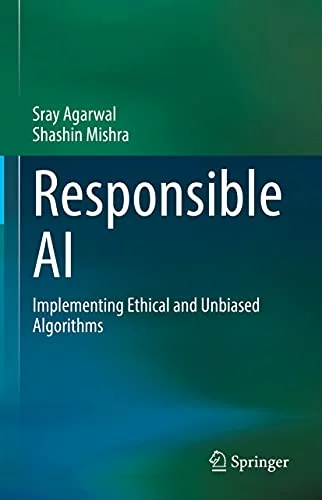At a Glance
Title: Responsible AI: Implementing Ethical and Unbiased Algorithms
Audience: Software product teams, Data Scientists, Business Analysts
Subject: Ethical and unbiased implementation of AI algorithms

Author: Sray Agarwal, Shashin Mishra
Language: English
Pages: 196
Price: approx. 18 – 42 Euro (Kindle) | approx. 73 Euro (hardcover) | approx. 44 Euro (paperback)
Positive: Practical approach, in-depth analysis, includes code examples
Negative: –
Buy: Amazon
In Detail
The book “Responsible AI: Implementing Ethical and Unbiased Algorithms” by Sray Agarwal and Shashin Mishra deserves the designation “toolbox” as it not only imparts theoretical knowledge but also provides practical resources such as code snippets, case studies, and checklists. These tools enable readers to integrate ethical principles directly into their AI projects.
For those looking to develop a data strategy, ethical AI is crucial as it forms the foundation for trustworthy and sustainable solutions. The book emphasizes the relevance of fairness, explainability, and data protection in AI models. These ethical aspects can be directly incorporated into a data strategy to ensure that the developed models and algorithms are not only efficient but also ethically justifiable.
The authors, Sray Agarwal and Shashin Mishra, are not only theorists but also practitioners with extensive experience in AI and data science. For instance, Sray Agarwal has developed a Responsible AI Framework for one of the largest banks in the United Kingdom, while Shashin Mishra has created transformative AI products across various industries.
The writing style of the book is designed to be accessible to both beginners and experts . It offers a balanced mix of theory and practice, including concrete application examples such as implementing fairness filters in AI models or using explainability algorithms, without being too academic or too superficial. These practical applications make the book a versatile resource that is equally useful in academic, industrial, and entrepreneurial contexts.
Overall, this book is an indispensable resource for anyone seriously dealing with the ethical and unbiased implementation of AI algorithms. It covers both the theoretical foundations and practical aspects, providing a holistic perspective that makes it a valuable addition to the library of any data scientist, ethicist, or business analyst.
This text was created with the help of ChatGPT .

